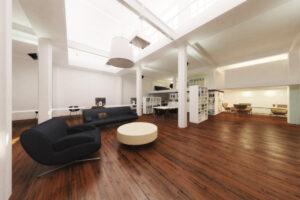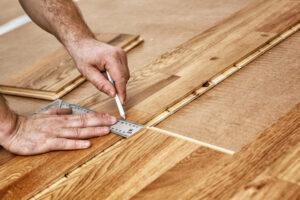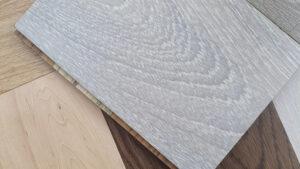What Is Engineered Hardwood Flooring?
Engineered hardwood flooring is a high-tech hardwood floor that is designed to give you the elegance and beauty of solid wood flooring without any of the installation hassles, warping issues and at a fraction of the cost of solid hardwood. Some of the most popular hardwood species used for solid hardwood flooring are white oak, maple, and walnut.
On its surface, engineered hardwood flooring looks just like solid hardwood flooring, and the top layer is made of the same species of real hardwood. Underneath the thin layer of hardwood on top is a layer of high-quality plywood core that is permanently bonded to the hardwood layer.

Things to consider when choosing a solid hardwood plank floor.
Solid hardwood flooring planks are a classic choice, and they typically come in varying lengths, ¾ of an inch thick and most often 2 1/4 inches wide. Homeowners have been choosing solid hardwood for hundreds of years, and when you pick a good grade of properly seasoned and stabilized hardwood planks, they can last a lifetime.
If you choose to go with solid hardwood, there are some important things to keep in mind. Flooring installation can be quite costly. Subfloors need to be properly prepared. Then the floor is sanded, sealed, and stained. Once the stain has been applied and you’re happy with the color and shade, a protective layer or two of high-quality finish like polyurethane is applied as a wear layer.
Each step must be expertly accomplished, and the entire process can take some time. And, of course, the hardwood planks often come in varying grades. It’s important to double-check that the grade you’re buying is what you expect. Needless to say, this is not a suitable project for even a handy DIYer.

Depending on where you live, the climate may be dry, or humid, and this can play havoc with a solid plank wood floor. Once you purchase your flooring, it must be acclimatized to the conditions in the room where you will be using it. Storing the wood in the garage or in a shed and then installing it later is a risk. This step cannot be skipped or rushed.
Even the best polymer-based finish that can be applied once your floor is ready is not as tough or as durable as the factory-applied finishes of engineered hardwood flooring options. The good news is they can be sanded and refinished several times before they need to be replaced. Sanding and refinishing is definitely not a DIY project, no matter what the rental place says about its sanding equipment. Ultimately, with proper care, a solid hardwood floor can last as long as your home.
What are the advantages of engineered wood flooring?
Although the top layer of hardwood veneer is thin, the protective finishes applied at the factory are unmatched in terms of durability and performance. The finishes are so tough; the best-engineered hardwood floors are water-resistant and can be used in the kitchen.
The construction method used with engineered hardwood floors is designed to counteract one of the most common problems with solid hardwood floors – and that is warping and cupping. The high-quality plywood core makes these floors vastly more stable than solid wood floors. This is a significant advantage that affects long-term performance. The engineering involved also makes this type of flooring much easier to install.
DIYers that have a bit of experience with home improvement can install the engineered floor themselves. Some of them come with a click-lock feature that further strengthens the integrity of the floor.

How long do engineered hardwood floors last?
Even though the factory-applied finish on engineered hardwood is superior to what can be applied on-site with solid hardwood, eventually, you may need to refinish the floor. Engineered hardwood flooring cannot be sanded and refinished as often as a solid hardwood floor, but it can be done by a professional. A well-maintained engineered floor can last 20-30 years.
Which is better, solid hardwood or engineered hardwood?
At the end of the day, it comes down to personal preference and intended purpose. Depending on where you live, some of the costs may vary.
Both solid hardwood and engineered hardwood are excellent choices for your home. Both can make a significant impression, especially when it is used throughout the house. Both can add substantial appeal and a broad range of colors to any new home buyer.
Take your time, and please look at a variety of floors in both solid hardwood and engineered. The first step is finding a local trusted retailer with experts on staff. Each home has its specific requirements, and every homeowner has different preferences. This adds up to a lot more than anyone can cover in an article such as this.
Please don’t hesitate to ask as many questions as possible at your local outlet. The people there know a lot about floors, and they’re more than happy to share their knowledge and recommendations with you.


